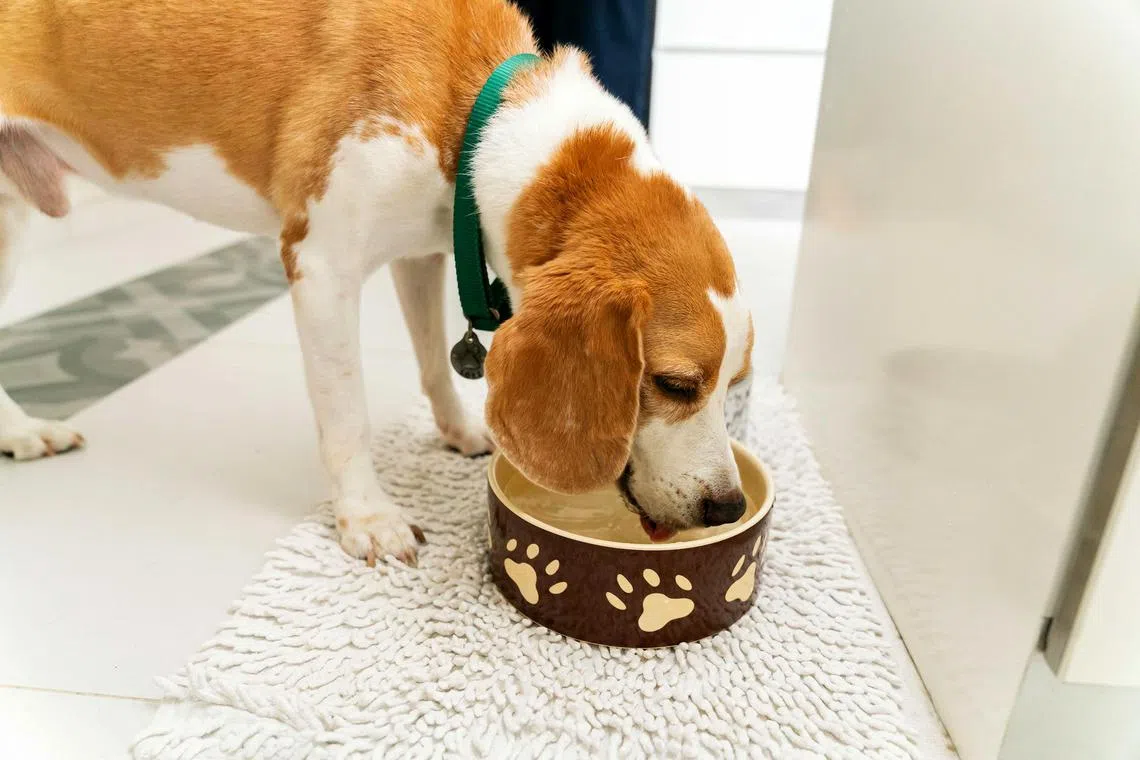Vet Talk: Pet food and supplement myths you need to know
Sign up now: Get ST's newsletters delivered to your inbox

Pet owners should consult veterinary professionals before making significant changes to their pet’s diet or adding supplements.
PHOTO: ANIMAL & VETERINARY SERVICE
Audrey Chen
Follow topic:
Proper pet care and nutrition form the foundation of responsible pet ownership. However, trying to navigate the sea of information, misinformation and misconceptions can sometimes be difficult.
Common misconceptions about pet nutrition
1. Cats love milk
Despite popular belief and images from our favourite cartoons of cats lapping up milk, most adult cats are lactose intolerant.
While kittens can digest their mother’s milk, adult cats lack the necessary enzymes to properly process dairy products.
Feeding milk to adult cats typically results in digestive issues, including diarrhoea and an upset stomach. Instead, fresh, clean water should always be freely accessible as their primary drink.
2. All bones are safe for dogs
Cooked bones can splinter and cause serious internal injuries such as gut or intestinal perforations in dogs. Even raw bones can sometimes cause problems like broken teeth, choking and intestinal blockages.
Always supervise bone chewing and choose large joint bones appropriate for your dog’s size, to prevent them from swallowing the bones whole.
Remove the bones once they start to splinter or are small enough to swallow. Consider alternatives such as commercial dental chews or hard rubber chew toys.
3. Rabbits need only carrots
The notion that rabbits should be fed mainly carrots is a dangerous myth. While carrots are safe as occasional treats, they are high in sugar and should make up only a small part of a rabbit’s diet.
The bulk (about 80 per cent) of a rabbit’s nutrition should come from high-quality hay. This can be supplemented with a variety of leafy greens. Excessive carrot consumption can lead to obesity and dental problems.
4. Hamsters need only seeds
While seeds form a part of hamsters’ diet, it should only make up about 10 per cent, as an all-seed diet is too high in fat.
Hamsters need a mix of commercial pellets, small amounts of fresh fruit and vegetables, seeds, occasional protein treats like mealworms or boiled eggs, and hay for fibre.
Additionally, hamsters do not need constant access to food and one main feeding per day is usually sufficient. Do not feed hamsters flavoured and seasoned seed snacks meant for humans, which are often high in salt and sugar.
5. Raw meat diets are healthier and more natural
While wolves and wild cats eat raw meat, domestic pets have evolved alongside humans. Raw diets can carry risks of bacterial contamination and may not provide complete nutrition unless carefully balanced.
6. Birds eat only seeds
Seeds are high in fat but lack essential vitamins and minerals. Most pet birds need a varied diet, including fresh vegetables and fruit, high-quality pellets, limited amounts of seeds and occasional protein sources, such as cooked eggs or mealworms. Birds like lorikeets need specialised nectar-based diets.
Popularity of supplements online
The rise in popularity of both pet ownership and internet shopping has resulted in a booming online market for pet supplements.
This presents several concerns regarding quality control, misleading health claims and potential negative interactions, as supplements could interact with prescribed medications or worsen existing health conditions.
Pet owners should carefully consider these options and remember that supplements are not a substitute for proper veterinary care.
Additionally, human supplements may not be safe for pets even if they contain similar ingredients. Pet owners should check with their veterinarian on the composition of the supplements before feeding their pets.
Safe approaches to pet nutrition
Instead of falling for common myths or turning to unregulated supplements, owners should rely on these evidence-based approaches:
1. Consult veterinary professionals before making significant changes to your pet’s diet or adding supplements. They will provide advice based on your pet’s specific needs and health status.
2. Choose complete and balanced commercial pet foods appropriate for your pet’s life stage. These foods are formulated to meet all essential nutritional requirements without the need for additional supplementation in most cases.
Similarly, you should consult your veterinarian before starting your pet on any specialised diet formulated for specific health conditions, such as kidney or liver conditions.
3. Monitor your pet’s response to any dietary changes. Watch for signs of digestive upset or changes in energy levels. Seek veterinary attention if signs persist.
4. If supplements are necessary, purchase them through veterinary clinics or reputable pet shops. These sources are more likely to ensure product quality and provide professional guidance on proper usage.
Guidelines for proper pet care, nutrition
1. Regular exercise and environmental enrichment support your pet’s natural immunity and well-being.
2. Regular veterinary check-ups help detect potential issues early.
3. Proper dental care prevents the need for certain supplements.
4. Species-appropriate diets typically provide all necessary nutrients.
By focusing on these fundamentals and avoiding common misconceptions, pet owners can ensure their companions receive optimal nutrition without unnecessary risks.
While the internet offers convenient access to pet care products, professional veterinary guidance remains the most reliable source for nutritional advice and supplement recommendations.
Dr Audrey Chen is the director of the Centre for Animal Rehabilitation at the Animal & Veterinary Service.
Vet Talk is a fortnightly column where veterinarians offer advice on pet issues.

